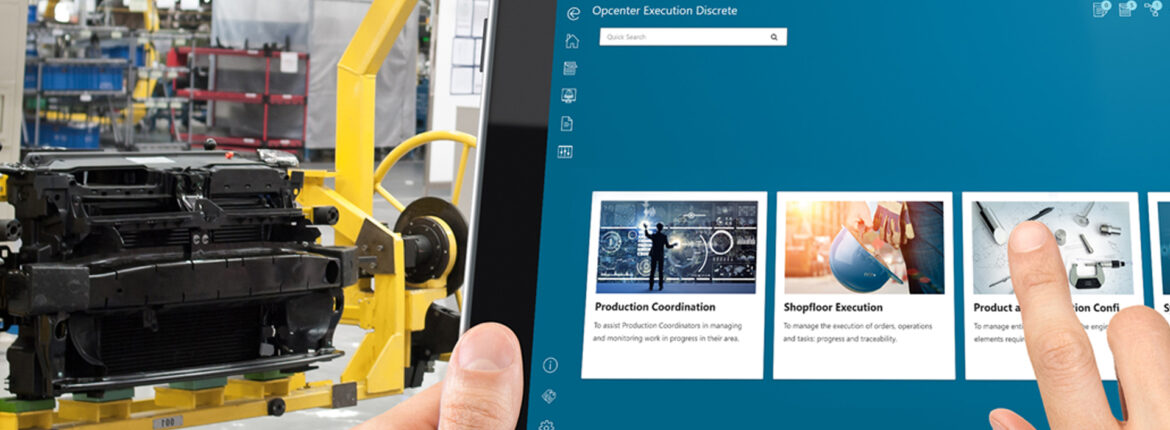
9 essential functions for your Manufacturing Execution System (MES) | Industrial Machinery
Manufacturing high-technology devices requires managing production complexity, maintaining and improving quality, reducing costs, and decreasing the time-to-market for new products.
A Manufacturing Execution System (MES) should be able to deliver all of this.
The right MES solution includes at least 9 functions, all tailored to meet the needs of a complex job-shop organized factory:
1. Production process and flow control
An MES considers production operations, steps, material items and resources with accurate work-in-progress management of orders, operations, batches, and serial numbers. Additionally, distributing workload among operators at shift start while taking their skills into account gives planners the ability to define teams of operators working on the same operations.
2. MOM integrated with Product Lifecycle Management (PLM)
When MOM (Manufacturing Operations Management) connects to PLM, it gives manufacturers the ability to create configuration-specific work orders based on variant processes, analyze the impact of changes on planned and running work orders, and expose plant resources from MOM to PLM to enable manufacturing engineers to address correct data. An MES solution will also send nonconformance feedback to PLM.
3. Production route enforcement
An MES solution can optimize personnel from start to finish. Multiple different operator skillsets, operator time logging, production scheduling, and checking the accuracy of process steps execution can all be managed within the MES.
4. Execution management
Performed activities, part assembly, and tool usage all account for how something is manufactured. The right MES can display and track these things on a granular level to find ways for improvement. Additionally, users can check for part and tool accuracy and interact with external DNC systems for CNC part program transfers. Additionally, separate labor tracking on non-productive activities can give manufacturers a better idea of the true cost of products.
5. Tracking and tracing
Serial numbers, batch identifiers, and product tracking all play key roles for materials and products as they move across the manufacturing floor. An MES solution also centralizes reporting with as-built and genealogy reports in a single location.
6. Defect tracking and nonconformance management
The right MES should provide failure tracking, nonconformance lifecycle management, capabilities to manage and execute rework processes, and leverage integration with a PLM to perform quality inspections.
7. Paperless manufacturing and reporting
Minimizing paper waste is made easy with electronic work instructions, data collection points, and support for barcode reading.
8. Electronic data collection
Manufacturing floors produce an enormous amount of data, and that data can be collected and used to provide valuable insights into the manufacturing process. An MES solution can be used to collect, store, and analyze all that information.
9. Additive manufacturing support
As additive manufacturing continues to grow and evolve, it’s important to have an MES in place capable of interacting with CAM systems to inject serial numbers into print file jobs and the ability to interact with 3D printers. Additionally, tracking and displaying powder material batch genealogy and substrate lifecycle are critical to additive manufacturing quality.
Get what you need from the right manufacturing execution system
Manufacturing Execution Systems provide a significant return on investment, especially when solutions tackle some of the manufacturing industry’s biggest challenges out of the box.
Begin optimizing your entire value chain and improve efficiency, flexibility, and time-to-market with a holistic approach.
By digitizing their processes, manufacturers are better equipped to initiate or respond to disruptive innovation trends.
And once in place, the right solution begins working to solve common business problems, production challenges, and IT issues.
Read this white paper and learn more about Opcenter, a holistic automation solution covering every major Industry 4.0 requirements.
Opcenter Execution Discrete | White Paper

Don’t hesitate to contact Thanh for advice on automation solutions for CAD / CAM / CAE / PLM / ERP / IT systems exclusively for SMEs.
Luu Phan Thanh (Tyler) Solutions Consultant at PLM Ecosystem Mobile +84 976 099 099
Web www.plmes.io Email tyler.luu@plmes.io
